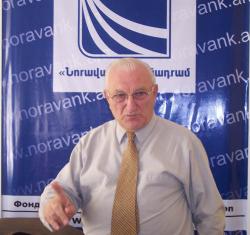THE LECTURING IN “NORAVANK” BABKEN VARDANYAN: “NO STATEHOOD IS POSSIBLE WITHOUT IDEOLOGY AND NO IDEOLOGY WITHOUT FAITH”
 On October 10, 2007 in “Noravank” Foundation was delivered a lecture on the subject “Faith, ideology and statehood” (lecturer – “Aik” Institution director and the RA Prime Minister advisor Babken Vardanyan), which was the second lecture in accordance with the “Noravank” educational program on “Armenia and the Armenians in global developments: the present situation and challenges.”
On October 10, 2007 in “Noravank” Foundation was delivered a lecture on the subject “Faith, ideology and statehood” (lecturer – “Aik” Institution director and the RA Prime Minister advisor Babken Vardanyan), which was the second lecture in accordance with the “Noravank” educational program on “Armenia and the Armenians in global developments: the present situation and challenges.”
In the beginning of the lecture the lecturer mentioned that the subject of his topic was quite non-traditional, as for about 70 years it has been all the time mentioned that faith and ideology had no connection with statehood, whereas there was a considerable connection among them. This issue is more actual for the Armenian nation in the making of its statehood. Under the conditions of crating statehood from the very beginning with great difficulties, the ideology is a power, resource and potential: “in the name of the idea, many have chosen the way of exile and hardship: the idea empowered our liberation struggle. Under present conditions the power of idea must be used skillfully. Should you not have it, just acquire, should you not know – learn.”
B. Bardanyan mentioned that in our days we often come across to the manifestation of non-action. So, what kind of ideas do we need in this epoch of mercenariness: should they be ideas made on the basis of “-isms” sank into oblivion or others? If there are no ideas in the arsenal making the soldier do his duty for his homeland, than one must be quick to create them. The lecturer mentioned that Armenia didn’t have statehood for many centuriesm, however it had managed to exist thanks to its ideology. “Today we can’t solve our problems by ourselves: in the past we turned to Moscow and today we turn to the EU.”
The lecturer is sure that we have ideology: this is an ideology springing from faith and based on it. At that one shouldn’t create ideology artificially, taking little from everywhere: “Here one can’t cheat, everything should be precise. It should spring from out of you and origin only from the faith.” This ideology must be steady and be stronger than defense. As an example, B. Vardanuyan brought Vardan Mamikonyan’s appeal to the Armenian troops before the battle of Avarair (this question was thoroughly studied by him when hewas working on the brochure envisaged for our soldiers): “which words and definitions were used by Vardan Mamikonyan! He was citing from examples from the Gospel, which means that our soldiers knew Holy Scripture. How far are we today from such characters! Whereas it is our heritage and we must get to know and use it.”
During the discussion which followed the lecture the lecturer made some tenets of its speech more precise. Thus, in answer to the question that in its time the US was created on the basis of values of that time, and today it is hardly possible to crate a suchlike powerful state on the basis of those values, B. Vardanyan said that today one can speak about devaluation of today’s values, however the flywheel is twisting thanks to the heritage of our ancestry.” The lecturer also was confident that our nation had values equal to the ones of Christianity still in the epoch of our ancestor Hayk and in 301 they were just hallowed, and these values are also our common property. In answer to the question-speech what hinders the Armenian authorities having every leverage to create a strong ideology in ours state, B Vardanyan expressed an opinion that it was perhaps reasoned by the negative inertion moving us: there is a factor of self-interest, however, there are adaptable people even among the ones making decision. He specified that although he didn’t like the word “revolution”, having soviet shades, however, he thought that our society needed moral-ethical revolution, necessary to be carried out in everybody’s inword: “there is no other way and way out. From the other hand people say that they will do it, but if the others will follow them? One should take a risk even if you face misunderstanding. Let’s do it inside us and help our friends to do so.” In answer to the question what slogan would be suggested by the lecturer for the Armenians, he answered that in the slogans of many nations are openly or not-openly expressed the idea of some attainments on the account of the others, whereas, in our case it is not on the other’s account. “An Armenian serves the God serving his nation, and serving his nation, he serves the humanity,” said the lecturer in conclusion.


